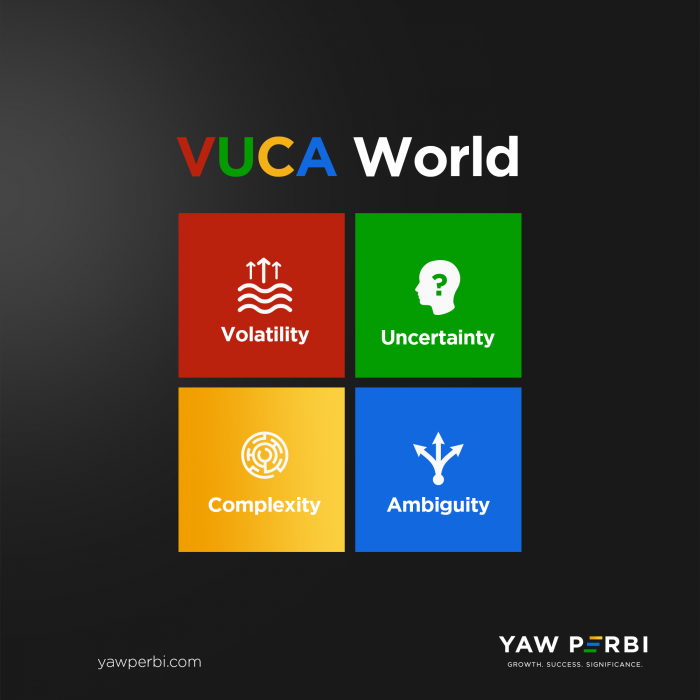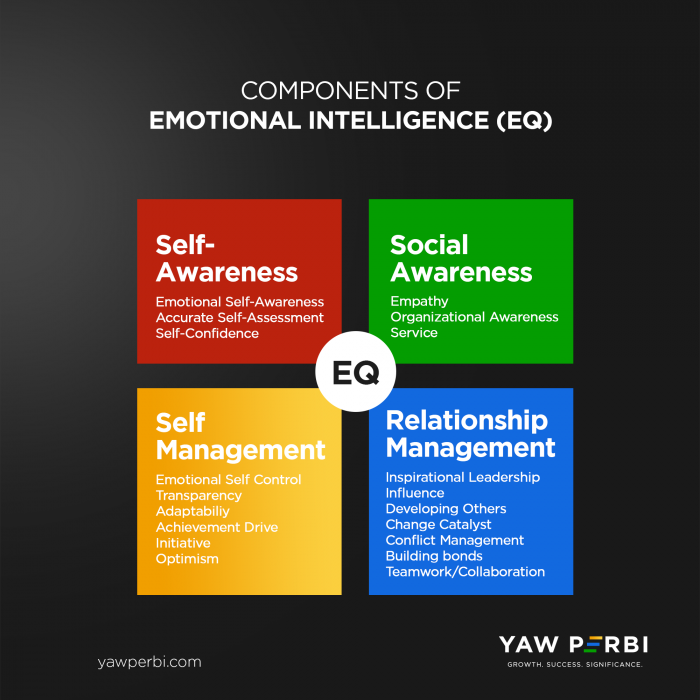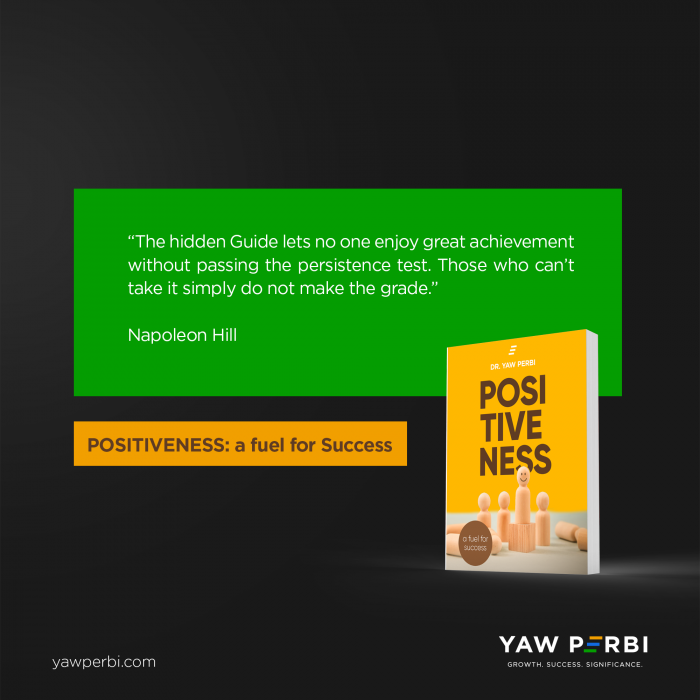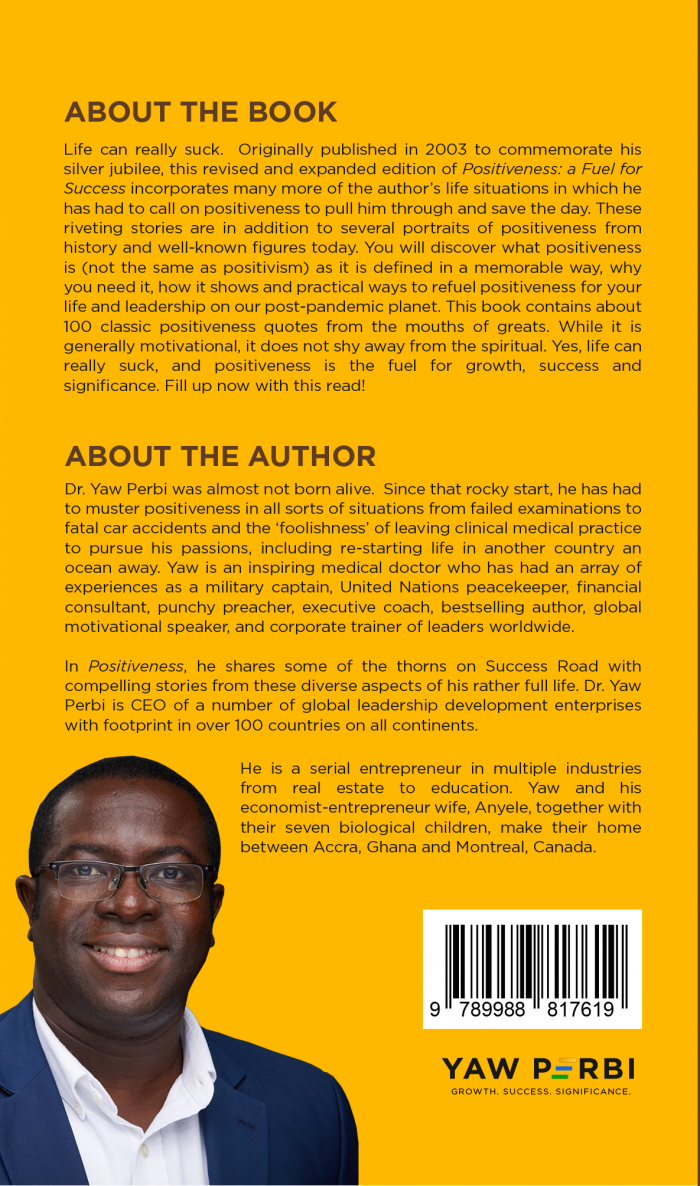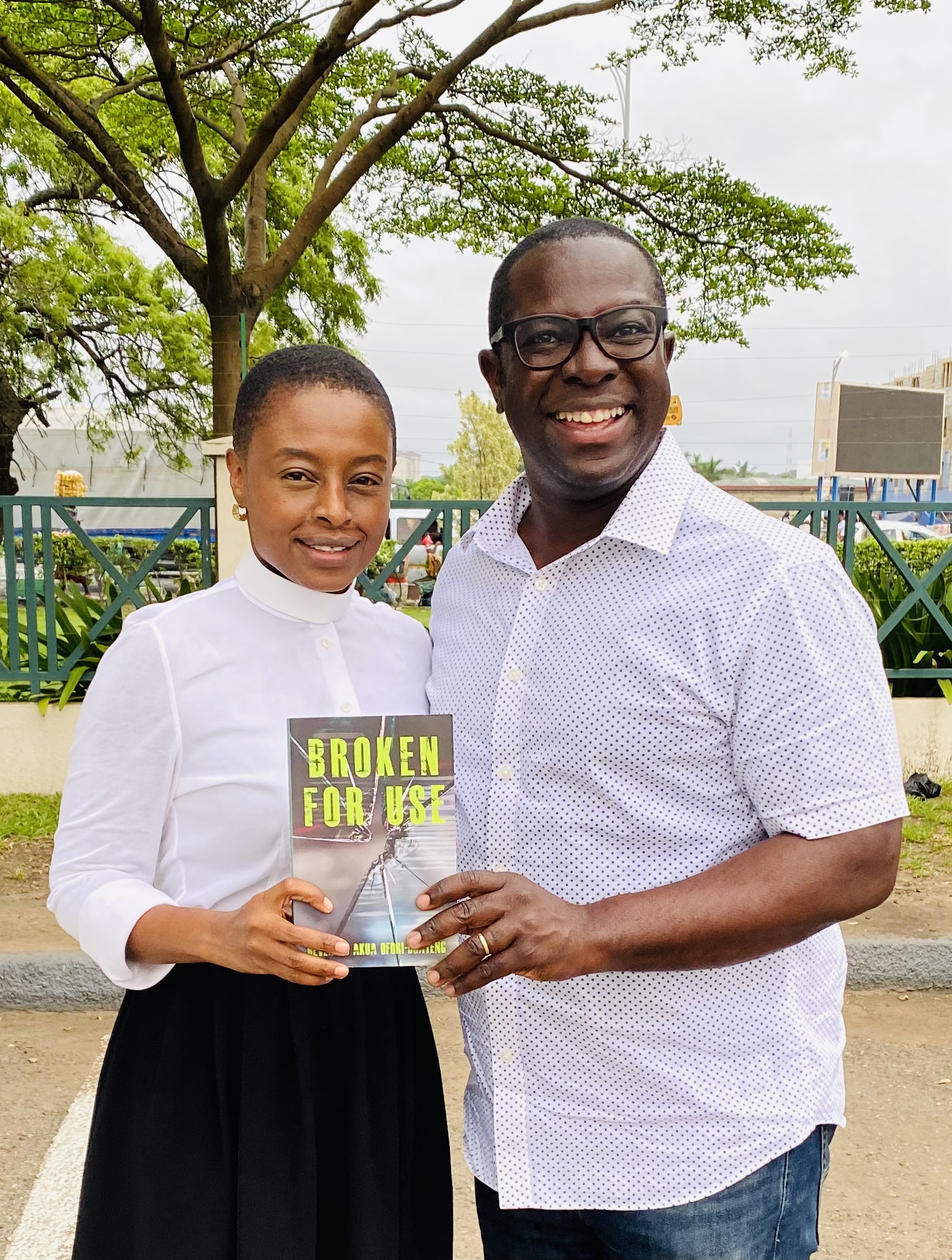
Leading From Life Story
Leadership is an interesting phenomenon. It is a more personal phenomenon than many people realize. I have been studying leadership for a while, at least for the last twenty-five plus years, and one of the greatest discoveries for me has been that leadership is not something ‘up there’ or ‘out there.’ The greatest leaders have been those who have been able to deeply reflect on their life stories and reframe them, leveraging their life stories to lead.
Growing up in Ghana as a student of leadership, a lot of the apt illustrations and gripping stories I consumed were foreign, mainly coming from Western literature and audiovisuals. A case in point is Howard Schultz, CEO of Starbucks, as one of the best examples of how the corporate success of Starbucks is as a result of the reframing of his own life story, especially his dad’s misfortunes. Says Mr. Schultz himself, “The reservoir of all my life experiences shaped me as a person and a leader.” Now, I am really excited that many more Africans are telling their leadership stories and writing, putting them in print. Finally, the lions are learning to write their own tales of the hunt.
MEET THE MECHANICAL ENGINEERING MBA
One of the CEOs in Ghana whose life story has taken a firm grip on me is a young lady I’ve just come to love. First, she’s just an amazing human being, very authentic. Then Akua is a professional in her own right, with a Masters in Mechanical Engineering, an MBA, a third seminarian masters and actually studying for a Ph.D as well. But the icing on the cake for me is this: she is a priest too!
The fascinating story of Rev. Akua Ofori-Boateng is chronicled in her thrilling autobiography aptly entitled ‘Broken For Use.’ It is raw, real, and very vulnerable—perhaps the most vulnerable Ghanaian, or maybe even African, autobiography that I have read.
Akua is CEO of Aequitas, an organization desirous to see every youth find and pursue their passion. She and her team do this by providing internships and safe learning spaces for youth to explore, discover their gifts and find their purpose. And when you have read her story—the intriguing tale of a privileged, middle-class girl yearning for approval—you will immediately understand why she would found and lead such an organization—from her life story!
WHY LEADING FROM LIFE STORY MATTERS
The passion and purpose of your leadership would come from your life story. If you are going to have dedication and commitment to leadership, it will need to come from leading from your life story. If you are going to have inspiration and motivation, it comes from your life story. If you are going to have a true north for your leadership, it comes from your life story.
I am exceedingly glad to be collaborating with her at YAW PERBI to impact youth and C-Level Executives because authentic leadership comes from leading from your story. Watch out for opportunities for collaborative training, coaching, workshops, publishing etc. with the Rev. when it comes to this whole area of authentic leadership. Just before wrapping up lunch with her the other day, I wanted her to share with you why she wrote this book and what it means for her life and leadership. You may watch the short, unrehearsed and upstaged video I captured here or read a transcript of her convincing spiel below:
Rev. Akua Ofori-Boateng: I wrote this book because when I was young and struggling with my own insecurities and challenges, I didn’t have any book like this to read, anything to tell me of that what I was going through was normal and that anybody had been through such. Certainly no one my age was talking about it from being that age. I wrote this so that young people who are struggling and unable to forgive themselves and have made some of the mistakes I made would recognize that we all make mistakes and that there is life after mistakes. The life after mistakes is a good life and a fulfilling one and a life that can benefit other people.
Dr. Yaw Perbi: How has your life story shaped your leadership?
Rev. Akua Ofori-Boateng: My life story and my leadership are inseparable. For me, I lead from a place of what I have experienced. And I want the young people to understand that you are not talking to perfection. You are talking to a person who is giving you advice based on their own issues, mistakes they have made and overcome so I lead from a place of authenticity. I got it wrong and now I’ve got it right; and if you got it wrong, you can get it right too.
CONCLUSION
Notable leadership experts from Bobby Clinton to Bill George have divided life into phases, usually three or four. It takes deep reflection to draw these out for oneself. The power of leading from life story is one of the many reasons why self-awareness is a sine qua non in leadership. There is no authentic or deep leadership without knowing one’s life story and reframing it as a source of inspiration, dedication and commitment, passion and purpose for your leadership. Your best leadership will not come from trying out a long list of characteristics of great leaders or even emulating outstanding ones, but from deeply reflecting on and leveraging your own life story. It will come from ‘in here’. The raw material needed for great leadership is found in your own life story. What a fascinating paradox that the outward journey of serving and influencing others first begins with a leader’s own journey inwards and backwards, drawing from the power of their own life story.

Leadership Is Not About You (And Not About Now)
Here I am 40,000 feet above sea level trying to piece together in readable form, a short video I shared last week on “Leadership is Not About You.” I’m en route back from an East Africa launch of my new co-authored book that took me to Nairobi (Kenya), Dar es Salaam (Tanzania) and Kigali (Rwanda), with a brief transit in Addis Ababa (Ethiopia). It’s been a while since I shot these PEP Talk videos because all roads have been leading to the launch of the movement and the said book, Africa to the Rest. The West Africa launch in Accra on March 31st had been so successful, buoying my team and me towards where the African sun rises for part two.
COMING HOME
Leadership is not about you, it’s about those you serve; it’s not about now, it’s about tomorrow. This truism landed in my heart as I touched down in Nairobi to a very warm welcome, ‘Karibu Kenya’ (welcome to Kenya). In Ghana we say, ‘Akwaaba.’ Ghana and Kenya have a diplomatic arrangement which allows citizens to visit each other’s countries without a visa. How wonderful. And this time also, the immigration officer did not ask me, “Why are you here, what’s the purpose of your visit?” Come to think of it, why would he? Who asks anybody, “Why are you coming home?” I’m home, Kenya is home.
That really is how the whole continent should look like yet traveling across Africa can be a nightmare. I am looking forward to the day when we do not need visas to travel across the second largest continent on the planet. I earnestly envisage the time when we’ll not have to change several currencies to travel across Africa. I am looking forward to the time when with one passport, one can fluidly go to all the 50 plus countries on the motherland. And that, my friend, will take tremendous leadership. How come I did not need a visa to Kenya, that all the way from Ghana, six hours flight away, I could just enter Kenya unhindered by red tape? Because at some point, once upon the time, a certain leader (or group of leaders) thought that was something great we could do for the mutual benefit of our peoples, for every Ghanaian and Kenyan.
As the driver was taking me from the Jomo Kenyatta International Airport (JKIA) to Severine Cottages in Karen (a suburb of Nairobi) where I was scheduled to lodge, courtesy of the owner Mary Ngechu, a YAW PERBI coaching client, we were having a conversation amidst a bit of road congestion from time to time. There had been some redirection of traffic in Nairobi because Kenya had just lost their third president, Mwai Kibaki, and this was preparation day for the funeral in the morrow. The next day was a holiday for his state burial, and several continental dignitaries were expected to arrive via the JKI airport. This driver was full of praise for the late head of state. “He was a good man, he built this highway we’re on, started free primary education for every Kenyan child…” he did this, he did that…. he was a good man. Far from perfect, it seemed from the narrative that Kibaki understood that his leadership was not about him, but about those he can been given influence to serve; and that his leadership wasn’t just about then (2002-2013), but about tomorrow.
NOT ABOUT YOU
Leadership is not about us; it’s not about you. It’s all about those we serve and influence towards some shared, noble purpose. I find it very sad when we have leaders, especially on our continent, who wants to loot all the wealth they can get, grab all they can eat and can the rest for tomorrow for their children and grandchildren. But leadership is about the people, for the people.
The year 2063 is when the leadership of Africa is hoping to have one passport and this free, unhindered movement of people. It’s too far! By 2063, I will be 85 years old, if the Lord wills and if He tarries. Come on, things have to be sooner, much sooner. I am excited about the crucial interventions of YAW PERBI Executive Education, BCA Leadership, Africa Leadership Initiative, The HuD Group and all others working on the continent to catalyze authentic, effectual leadership because everything does rise and fall on leadership. Leadership is indeed cause, everything else is effect, and l felt that right that morning when arrived in Kenya.
AFRICA CONSOLIDATING
I can confidently tell you that the dream of one Africa, one passport, no visas can happen. It took a certain Jean Monnet to get the European Union going in that direction (I remember that so vivildly from our Africa Leadership Initiative/Aspen Institute readings from over a decade ago). The ability to not only fly from the top of Tunisia to the tip of South Africa, or from the cusp of the Cape Verde peninsula to the extreme edge of Mauritius unfettered and unvisa-ed, but even drive across the length and breadth of the continent is a dream I share with many others on the continent and in the diaspora. Imagine no need to change several SIM cards, no need for consecutive currency exchanges and having eight different specimens of shillings in your breaking purse. This is the Africa we want; yea, even the Africa we need.
For sure, this will take visionary, effectual leadership. Remember, leadership is not about us, it is about those we lead and their aspirations, even that of those who would come tomorrow. Are you pepped up to lead and leave a lasting legacy? Leadership is not about you, it’s about those you serve and influence towards a shared, noble purpose. It’s not even about now; it’s about tomorrow. Let your leadership count years from now, thousands of years from now, even into eternity.
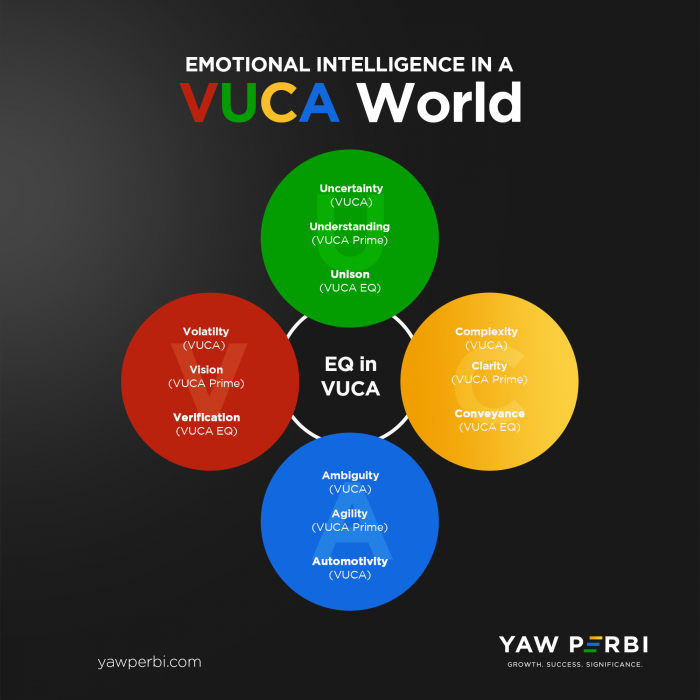
SO YOU THINK YOU CAN LEAD WITHOUT EQ IN A VUCA WORLD?
As one of the Pan African Cohort facilitators of BCA Leadership, I just got off a scintillating Zoom call with amazing African C-level leaders from across the continent—East Africa (like Kenya and Uganda), West Africa (I recall Nigeria, Sierra Leone and Ghana), North Africa (Egypt) and Southern Africa (Malawi, South Africa). We talked about Emotional Intelligence and the whole idea of VUCA. The goal of this blog is to summarize the essentials of the topic, which most participants described as ‘intriguing’: “So you think you can lead effectively without EQ in a VUCA world?” Really, this is a rhetorical question because no one in their right senses would say, “Yes, I can lead effectively without Emotional Intelligence (EQ)” in the first place, let alone in a world that’s described as VUCA.
WHAT ON EARTH IS VUCA?
VUCA is a term that came from the military space, especially at the end of the cold world war when without the two clear polarizing forces the whole world was described as Volatile, Uncertain, Complex, and Ambiguous. Guess what? If the end of the last century was said to be VUCA then imagine just how much more VUCA it is now. Look at the volatility of the world today, look at the speed of transformation, the dizzying digital economy. Consider the uncertainty with COVID-19 and this post-pandemic world. Is it even a post-pandemic or rather para-pandemic world as in some places it seems over and in others, COVID is still raging? Look at the complexity of the world. How could a microscopic virus emerge in a small place in some corner of the world called Wuhan, China, and the whole world gets grabbed into this? Some things are just ambiguous right now. It’s a VUCA world. There wouldn’t be enough space to write out all the feelings these VUCA times have generated in people, especially anxiety.
HOW ABOUT EQ?
Even before the VUCAness of the world, Emotional Intelligence had been identified as the key thing for succeeding in leadership. It is archaic 20th century thinking that IQ (intelligence quotient) makes a good leader for a total leader not only has IQ, in terms of book smarts or cognitive intelligence, but also Emotional Intelligence (EI/EQ) in terms of being intelligent about feelings and Global Intelligence (GQ). Humans like to think we are rational people but at the end of the day we are emotional beings. The term was first coined in 1990 by researchers John Mayer and Peter Salovey, but was later popularized by psychologist Daniel Goleman five years later.
We now know that 80-90% of success in Executive Leadership depends on Emotional Intelligence and not cognitive intelligence. Don’t get me wrong, I am not dumb. I am a medical doctor for crying out loud. Intelligence is important but guess what? When it comes to Executive Leadership, IQ only gets you into the door, it takes EQ to play the game. And win. After about 128, IQ doesn’t matter anymore! Given the same level of IQ, technical skills, and competence, it’s EQ that would make all the difference in how much one succeeds (or not).
Emotional intelligence, according to Psychology Today, is “the ability to identify and manage one’s own emotions, as well as the emotions of others.” It is thus made up of the following four blocks:
BUT THERE’S PROBLEM
So being the amazing leaders we are, we figured out we cannot just sit idly twiddling our thumbs and watch VUCA happen without responding. In 2007, one Robert Johansen (a distinguished fellow at the Institute for the Future), came up with a behavioral leadership model he called VUCA Prime to counteract each of the four elements of VUCA with a specific positive response which starts with the same four letters. VUCA Prime then is to have Vision over Volatility, to overcome Uncertainty let’s have Understanding, then Clarity over Complexity and to overcome Ambiguity let there be Agility.
Well, I have been studying this since the pandemic began and was thinking recently how good VUCA Prime is but how so very cognitive it is! Why is VUCA Prime so cognitive and does not take enough emotions into cognizance especially when we know 90% of success will depend on a leader’s emotional awareness (of self and others) and responses?
WHAT IS VUCA EQ THEN?
Consequently, I have designed something called VUCA EQ to provide a more comprehensive and potent leadership response to VUCA beyond the cognitive, one that significantly takes emotional intelligence into consideration. Like VUCA Prime, each of the VUCA EQ responses also begins with the same four letters.
Firstly, V is Verification: we need to be able to decipher what our emotions are and label them correctly. Then we need to be able to do the same for others as well so we can respond rather than just react, and we can manage our emotions and that of others instead of just trying to control them. The world of command and control is gone!
Secondly, instead of Uncertainty and just responding with the cognitive Understanding that VUCA Prime proposes, we rather respond in Unison. What I mean by Unison is to respond with our three brains. You have the cognitive brain but you also have your emotional brain called the limbic system. EQ is not just a ‘heart’ kind of thing, no! Emotional Intelligence has to do with the brain too. Or even more annoying, called ‘soft skills.’ EQ produces hard results on the balance sheet and cashflow statements! There is the Cognitive brain, Emotional brain, and Instinctive brain and VUCA EQ is about responding with all three in unison.
For Complexity, not only overcome with clarity but with Conveyance. Powerfully transmit emotional then logical information and carry across values and perspectives, considering emotional data and communicating emotions first. Remember to start with emotional data when decision-making and communicating eg. I feel vexxed about this decision and I’m aware most people in the company feel anxious…. Connect with emotions and convey them in response to complexity.
Then finally, for Ambiguity, not only thrive with agility but by Automotivity. In other words, learn to move people’s emotions or move people emotionally. Automotivity means containing within itself the means of propulsion or movement. Mobilize people in such consonance and resonance with what they want (motives) and how they want (motivations) that they move in a self-propelling manner. After all, why do you suppose feelings are called e-motions? Feelings move us, they move the world. We may not like to acknowledge it but they do. How do you learn to know people’s motives and their motivations so that you can ride on that to send them (better still, travel with them) to a place where they ought to go?
CONCLUSION
Leadership is in the transportation business. We move people from here to there and without the power of Emotional Intelligence to move people (think e-motions) towards a shared, noble purpose, we are going nowhere ourselves in the first place and taking no one with us for that matter. Don’t you ever think you can successfully lead, especially in this VUCA world, without Emotional Intelligence.
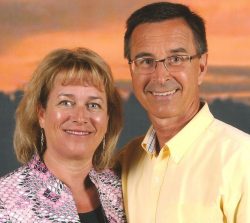
‘I DO’ or ‘NO CLUE’?
Happy Saint Valentine’s Day! I think it makes a difference when you prefix the ‘saint’ before ‘Valentine’s Day’ because unfortunately a lot of unholy things happen on Valentine’s day but it’s a day to celebrate a saint who out of love, gave of himself for others. That’s what the essence of love is, it’s not so much what we can get but what we can give.
This is why I love the commonest scripture which numerous people who are not even Christ-followers know that by heart (John 3:16): “ For God so loved the world that He gave…” Love is three things (3As): Love is an affect (emotion), an attitude, and an action. If you would take another look at the most famous passage in all the world about love, 1 Corinthians 13, you would see love showing up mainly as attitude and action. There are a few affects sprinkled here and there but mainly attitude and action. That’s what love is–not just an affect and an attitude but love is action, so love gives.
On this particular Valentine’s day, I want to send a shout out to the love of my life, Naa Anyele Perbi (nee Ampa-Sowa). We’ve been married for over 15 years now and one of the things that has saved and sweetened our marriage is searching for and satisfying each other’s emotional needs, something we learned from marriage mentors of ours in Montreal, Canada. Gerry and Kathy Kraemer do a marriage workshop and illustrate this beautifully. The point is that each of us–depending on where and how we were born and raised, our make-up/wiring, personality, life’s critical incidents etc.–receive love differently. This is not just the general and popular ‘five love languages’, no! This is way beyond that. This is deeper than that. Based on our life stories, we each have unique emotional needs.
The Kraemers love to tell the emotional needs tale this way: On the day we get married you we exchange vows and say, “I do.” Gerry and Kathy half-joking assert that we probably should rather say, “No clue!” instead of “I do!” for indeed, we have no clue what we are getting into, no matter how much in love we are and how much we think we know of ourselves and of the other. They actually project their 1970s wedding picture and ‘photoshop’ in an ‘invisible’ suitcase by each of them, symbolizing the baggage each of us comes into a marriage relationship with!
And this is how they illustrate it: Gerry is blindfolded by his wife, who then holds a cut-out heart, a big heart, right in front of her. Now, Gerry holding a bow and arrow (the plastic kind with a sucker at the end) then tries to hit the target, the heart of his dear Kathy, going boom, boom boom!!!! And guess what? He misses Kathy’s heart every time. Until eventually he allows her to remove the blindfold so he can now see exactly where her heart is and can strike it point blank or from afar, any and every time.
The point is this: there are a lot of books and audiovisuals out there that talk about love and romance in such generic terms such as ladies love flowers and guys like sex. Don’t buy this stuff! There are guys who love flowers and gals who have a bigger desire and capacity for sex than most men you know! There is actual work to do in specifically finding out through conversation and some tools (those who take our YAW PERBI Family Foundations Mastermind actually get to go through this) to know these things. Basically, you can find out from conservations with or without expert help. What makes your spouse feel fully alive? In other words, what gives oxygen to their souls? When you find that out (when your spouse let’s you in on the master key(s)–and by the way you don’t have to understand it!, you don’t even have to like it–just do it! When your spouse says, “I am XYZ and this is how l love to be loved, would you love me this way?” I hope your answer would be yes!
Today being St. Valentine’s Day, a lot of people are going to give gifts that they would have loved to receive; not gifts people would loved to get, necessarily. That’s how humans behave: we tend to give what we would like ourselves or what we think is good. But if we would take the time to hear the heart of whoever we’re trying to love, they would tell us, they would give us a clue what makes them feel loved or what gives oxygen to their souls.
“I am Yaw, this is how I love to be loved… (Errrm… I won’t tell you! Only Anyele knows that!) …Would you love me this way?” Love somebody the way they want to be loved, the way they feel loved this Valentine’s Day; not the way we want to love them. Have a Happy Valentine‘s Day!!! and a great month celebrating love, true and love, lasting love, pure love, for God is love. Whatever you do today, may be it be saintly!
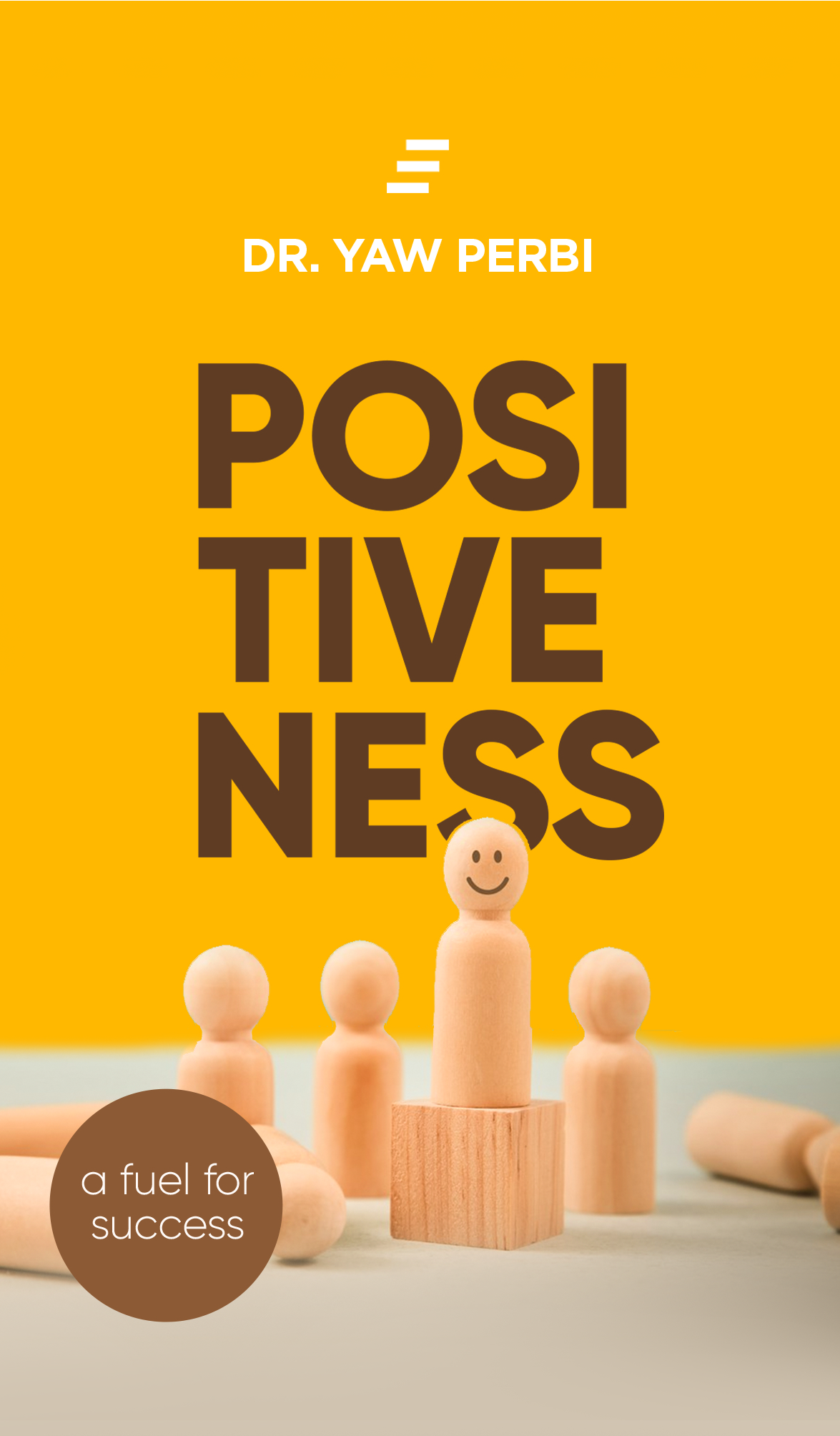
PANDEMIC OR NO PANDEMIC, POSITIVENESS IS STILL A FUEL FOR SUCCESS
The following is a snap peak of the preface to the third edition of Dr. Yaw Perbi’s third book, ‘Positiveness: a fuel for success’, first published in 2003 to commemorate his silver jubilee.
It took a global pandemic to make this third edition of Positiveness: A Fuel for Success, possible. I have been trying to republish this book for nearly a decade now. The revised manuscript was done in 2012, and I had nearly completed the back-and-forth with a publishing company. All was ready to go, or so I thought. Then life happened and I put this on the backburner. Until now. It took the lockdowns of the Coronavirus pandemic of 2020 to get this going again.
I have changed a lot since I turned 25 and first launched this book and so have many things too. We didn’t even have smartphones back then, and the internet was still a novelty. But some things have remained the same. After thousands of copies sold and many countries reached, “through all the changing scenes of life, in trouble and joy,” what hasn’t changed is the fact that positiveness is still fuel for success.
In the past two decades, I have lived and worked for a year or more in three countries on two continents. In doing so, I have needed a whole lot of positiveness, especially in those times when I was geographically separated from my family. I have formally had various occupations and preoccupations ranging from being a medical doctor in Ghana, a military captain with the United Nations in Cote d’Ivoire, a leadership consultant and speaker around the world, pastor of a Chinese congregation in the French city of Montreal, a financial security advisor and investment consultant, to being president of a couple of Canadian and global charities. Positiveness is still fuel for success no matter the field of endeavour.
You see, this book was only my third book and, back in 2003, I wrote and self-published it with a white cover and silver inscriptions to celebrate my twenty-fifth birthday (silver jubilee). At the time, I was a struggling medical student in Ghana attempting to do ‘what Napoleon couldn’t do’. I was trying to straddle the world of medicine and human development. In May 2003, together with a group of friends, while still in med school, I founded The HuD Group to inspire and empower young people to reach their full potential. Now I am a full-fledged medical doctor who has hung up his stethoscope— after four years of clinical practice—to focus on human development, especially holistic leadership development, because I sincerely believe, like my mentor John C. Maxwell, that “everything rises and falls on leadership.”
The HuD Group began in Ghana but, at the time of writing this, I am feverishly coordinating our global operations in two dozen countries on all continents of the world and currently domiciled in Montreal, Canada. If I thought I needed a daily prescription of positiveness back in 2003, then I might need a thrice daily prescription now. The two-year battle with the Canada Revenue Agency alone to get charitable status for The HuD Group warrants a book on its own. I’ll save that for another day, but it took positiveness to fuel my success.
When I was much younger and naïve, I dreamed of working with the United Nations. And unlike many for whom that is still a dream, I achieved it. I did that, for a year, in La Cote d’Ivoire. Even while already enjoying that success, I still needed positiveness as fuel when I got car-wrecked on July 21, 2008 and lost two of the military colleagues I was travelling with. It was positiveness that got me back on the road to recovery. My commanding officer, out of rare soldier-sympathy, wanted me to return home (to Accra, Ghana) and recuperate but cheers to positiveness, I was convinced to stay put and serve with grace. I prevailed. Positiveness prevailed.
So yes, life has changed—a whole lot— and so have I since 2003. Now married to my dear wife, Anyele, and a father to seven amazing children, I certainly have a broader and deeper perspective on life today. But if anything, these changes have only affirmed and confirmed the principles that were penned in this book nearly two decades ago. Positiveness is fuel for growth, success, and significance in any and every endeavour, and at whatever age and stage in life, that hasn’t changed.

THE PRESENCE ~ Part 3 (of 3)
Do you know the story about the wealthy arts collector and his son? Eventually when both died the man willed all of his wealth—unbeknownst to the other wealthy art connoisseurs and museums who were eyeing his stuff—to whoever bought the ‘unimpressive’ but deeply precious painting of his son. Usually, this story is told in an evangelistic sense for people to consider Jesus Christ as their Saviour and Lord—“whoever takes the Son, gets it all”—yet this is the same Son who said, “But very truly I tell you, it is for your good that I am going away. Unless I go away, the Advocate [THE PRESENCE] will not come to you; but if I go, I will send him to you” (John 16:7). Friend, whoever takes the Spirit, THE PRESENCE, into 2022, gets it all.
THE PAINTING is like THE PRESENCE
Everything you need is in THE PRESENCE; just like every painting the connoisseurs wanted was in that one painting of the son. Moses knew, that everything he and the Israelites would ever need was in THE PRESENCE. And so when God said “I’m not going with you guys any longer,” Moses retorted without skipping a beat, “then we’re not going!”
1Then the Lord said to Moses, “Leave this place, you and the people you brought up out of Egypt, and go up to the land I promised on oath to Abraham, Isaac and Jacob, saying, ‘I will give it to your descendants.’ 2I will send an angel before you and drive out the Canaanites, Amorites, Hittites, Perizzites, Hivites and Jebusites. 3Go up to the land flowing with milk and honey. But I will not go with you, because you are a stiff-necked people and I might destroy you on the way.” (Exodus 3)
As I said in the beginning, many people wouldn’t mind such a deal at all, just like heaven without God! If getting to the Promised Land was guaranteed, with an angel to boot, what’s the problem if it’s ‘only that’ God isn’t coming along for the ride? At the various Watch Night/Cross Over services around the world, I dare say that for the majority of people as long as were assured of the promises of God, angelic guidance and protection, prosperity of what to eat and wear and spend (milk and honey) in 2022, who cares about THE PRESENCE?!
12Moses said to the Lord, “You have been telling me, ‘Lead these people,’ but you have not let me know whom you will send with me. You have said, ‘I know you by name and you have found favor with me.’ 13If you are pleased with me, teach me your ways so I may know you and continue to find favor with you. Remember that this nation is your people.” 14The Lord replied, “My Presence will go with you, and I will give you rest.”
15 Then Moses said to him, “If your Presence does not go with us, do not send us up from here. 16 How will anyone know that you are pleased with me and with your people unless you go with us? What else will distinguish me and your people from all the other people on the face of the earth?”
The company you need is in THE PRESENCE, favour is in THE PRESENCE, pleasure is in THE PRESENCE, rest is in THE PRESENCE, distinction is in THE PRESENCE. We’ve all been raised to think how sad it was that Moses never entered the Promised Land. Are you sure? What if I told you he did? What if the Promised Land is God Himself? I’ll leave you to wrestle with that for a bit.
SO WHAT? FOLLOW THE CLOUD
I hope I’ve been able to convince you that EVERYTHING you need for 2022 is in THE PRESENCE of the LORD; all you’ll EVER WANT is in THE PRESENCE. Do you then now have the faith to pray, “Dear God, all I need for the New Year is YOU! so All I want for New Year, is YOU!”
Remember, s(h)e who takes the Spirit, THE PRESENCE, gets everything! Lord, LEAD! LORD, your presence or nothing! Will you follow the crowd or the CLOUD? Using ‘CLOUD’ as an a acronym, here’s how to practicalize this message and maximize THE PRESENCE in 2022: Cultivate, (Be) Led, Obey, Unwind, Discern.
1. CULTIVATE— Cultivate THE PRESENCE
This year, learn to stop at set times (also spontaneously) during the dam, calm your spirit (breathe in and out deeply) and centre yourself by being conscious of your breathing and God’s presence, saying, for example (with breathing in), “Lord, “I breathe in your Spirit…” and as you exhale, “I breathe out my stress or anger.”
Incidentally, on the very 31st January, prior to traveling to preach this message in the evening, my wife and I were going to look at a piece of property and burst a tyre. She had to continue alone in an Uber. Initially I was getting upset, wondering whether this was an attack on 31st or whatever… Then the Spirit reminded me of this very message. I stopped, calmed down, centred myself, cultivating THE PRESENCE.
2. LED— Be Led by the PRESENCE
“For those who are led by the Spirit of God are children of God…” (Rom 8:14). Let the Lord lead in 2022. Listen & be led.
3. OBEY—Obey the promptings of THE PRESENCE
What more is there to say?
4. UNWIND—Relax, Lounge, Chill and build intimacy with God
Mark Thibodeaux describes four stages of praying, or relating to THE PRESENCE. By unwind I mean the fourth; not the first three.
o Talking at God—This is simply parroting prayers, whether recited ones like “Bless me, Lord, for what we’re about to receive we thank thee O Lord” or the kind of mindless speaking in tongues
o Talking to God—We become more comfortable finding our own words to speak to God, rather than readymade prayers but still “give me, give me, give me more, Lord.”
o Listening to God—This is when we begin to enjoy a two-way relationship with him.
o Being with God—A final stage is where “finally, we simply enjoy being in the presence of God—who loves us. This is far more important than any particular activity we might do with Him [or for Him]. His presence makes all of life fulfilling.”
5. DISCERN—Scripture says we should not be foolish and act thoughtlessly, but understand what the Lord wants us to do, understudy God’s moves and waves and will. Moses said, “show me your ways” as He asked for God’s presence and glory. My favourite definition of discernment is Ruth Haley Barton’s: “the capacity to recognize and respond to the presence and the activity of God—both in the ordinary moments and in the larger decisions of our lives.”
CONCLUSION
Let’s thank God for every time you experienced THE PRESENCE in 2021. Confess your eagerness to have stuff and success in 2022 but not necessarily HIM! Let’s pray for a life that follows the CLOUD in 2022. If you’re serious about THE PRESENCE, tell God, in the words of Don Moen’s classic:
If Your presence doesn’t go with us
Lord we don’t want to leave this place
Lord we need You near
As we go from here
To lead us by Your love and grace
May Your presence fill us every day
May Your Spirit lead the way
Lord to You we call
Let Your glory fall
And may Your presence go with us
If we have found favor in Your sight
Show us Your ways O Lord
Cause we want to know You
And live in Your light
For all of our days
Show us Your ways
We have our hopes
And we have our dreams
But we cannot go
Where You will not lead
Lord to You we call
Let Your glory fall
And may Your presence go with us
Rest assured, we have a guaranteed general, guide, guard, giver and glory for 2022, the “Captain of Israel’s Host,” THE PRESENCE.

THE PRESENCE ~ Part 2 (of 3)
17When Pharaoh let the people go, God did not lead them on the road through the Philistine country, though that was shorter. For God said, “If they face war, they might change their minds and return to Egypt.” 18So God led the people around by the desert road toward the Red Sea. The Israelites went up out of Egypt ready for battle. … 20After leaving Sukkoth they camped at Etham on the edge of the desert. 21By day the Lord went ahead of them in a pillar of cloud to guide them on their way and by night in a pillar of fire to give them light, so that they could travel by day or night. 22Neither the pillar of cloud by day nor the pillar of fire by night left its place in front of the people. (Exodus 13)
THE PRESENCE FROM EGYPT
God will not necessarily lead you through the shortest routes in 2022 but the best routes, according to His good, pleasing and perfect will. God was Israel’s captain as they exited Egypt to possess the Promised Land. A captain is a commanding officer of a ship, someone in command or a leader of a group (like a football team). This captainship is clearly captured in phrases like “God did not lead them…” (v. 17); “So God led the people…” (v. 18); “By day the LORD went ahead of them… to guide them” (v. 21); “…in front of the people” (v. 22).
And they were many, an estimated 2 million of them! It is no wonder they are described as a host (like stars or a vast army). A host is “a multitude or great number of persons or things.” God was the General, Guard & GPS of this ginormous group, host!
THE PRESENCE IN ENGLAND
It is this amazing story in Exodus 13 that captured the imagination of Charles Wesley (1707-1777), the brother of the founder of Methodism (John Wesley) to pen those words in 1762 (the original words are in bold, my brief commentary is in italics):
Captain of Israel’s host, and Guide
Of all who seek the land above,
The same God who was Captain of the Israelites exiting Egypt to the Promised Land called Canaan is the Guide of those of us who eventually want to exit Earth to the Promised Land above we call Heaven;
He can be the General of those of us exiting 2021 and wanting to enter the Promised Land called 2022. For he is the same yesterday, today and forever.
Beneath Thy shadow we abide,
The cloud of Thy protecting love;
The shadow, cloud, pillar of fire—these are all metaphors of THE PRESENCE.
Will you abide (John 15) in THE PRESENCE for intimacy (love), protection, provision, piloting (guidance), production (fruitfulness)…
Our strength, Thy grace, our rule, Thy Word;
Jesus Himself says, “my grace is sufficient for you for my power is made perfect in your weakness in 2022” (2 Corinthians 12:9).
What laws or constitution or playbook will you live by in 2022? How about the Basic Information Before Leaving Earth (Bible), which itself is already saturated with THE PRESENCE?
Our end, the glory of the Lord.
Is God’s glory the purpose and end goal of your life or your own idea of what is cool and successful? God’s own glory is God’s mission!
It is no greatness if it brings God no glory!
A WORD ABOUT GOD’S GLORY IN UNEXPECTED PLACES & WAYS
God’s glory can show up in ways and places that are strange to the human mind. Think about it: one day in John 9, “As [Jesus] went along, he saw a man blind from birth. 2 His disciples asked him, “Rabbi, who sinned, this man or his parents, that he was born blind?” 3 “Neither this man nor his parents sinned,” said Jesus, “but this happened so that the works of God [or the glory of God] might be displayed in him.” But blindness?!
How about when Jesus says to Peter (John 21), “Very truly I tell you [Jesus says to Peter], when you were younger you dressed yourself and went where you wanted; but when you are old you will stretch out your hands, and someone else will dress you and lead you where you do not want to go.” Jesus said this to indicate the kind of death by which Peter would glorify God. Then he said to him, “Follow me!” A death that glorifies God? Come on! JUST FOLLOW THE PRESENCE.
THE PRESENCE is powerful; even in the valley of the shadow of death, according to twenty-third Psalm, I fear no evil for you are with me (THE PRESENCE). In Genesis 39, “…while Joseph was there in the prison, 21the Lord was with him; he showed him kindness and granted him favor in the eyes of the prison warden. 22So the warden put Joseph in charge of all those held in the prison, and he was made responsible for all that was done there. 23The warden paid no attention to anything under Joseph’s care, because the Lord was with Joseph and gave him success in whatever he did.” THE PRESENCE in prison; glory through prison. Unstoppable God; unboundable PRESENCE!
BACK TO EXODUS
We’re told in the ninth chapter of the book of Numbers that:
17Whenever the cloud lifted from above the tent, the Israelites set out; wherever the cloud settled, the Israelites encamped. 18At the Lord’s command the Israelites set out, and at his command they encamped. As long as the cloud stayed over the tabernacle, they remained in camp. 19When the cloud remained over the tabernacle a long time, the Israelites obeyed the Lord’s order and did not set out. 20Sometimes the cloud was over the tabernacle only a few days; at the Lord’s command they would encamp, and then at his command they would set out. 21Sometimes the cloud stayed only from evening till morning, and when it lifted in the morning, they set out. Whether by day or by night, whenever the cloud lifted, they set out. 22Whether the cloud stayed over the tabernacle for two days or a month or a year, the Israelites would remain in camp and not set out; but when it lifted, they would set out. 23At the Lord’s command [captain of the host!] they encamped, and at the Lord’s command they set out. They obeyed the Lord’s order, in accordance with his command through Moses.
The second verse of Wesley’s hymn continues…
By Thine unerring Spirit led,
We shall not in the desert stray
THE PRESENCE makes no mistakes—He is the omniscient (all-knowing) One to steer us aright from missing our way yet if we sin and stubbornly deviate He also is the gracious omniponent (all-powerful) One to, like a GPD does, re-route us, even if it takes 40 years in the wilderness! Re-calculating… Re-calculating…
We shan’t be lost in 2022, amen!
Just move when God moves; stop when He does; stay when he stays.
We shall not full direction need
It was reprinted in A Collection of Hymns for the Use of the People called Methodists (1780), where John Wesley altered this line 3 of verse 2 from, ‘The light of man’s direction need’ to ‘We shall not full direction need’.
Nor miss our providential way;
Just as He gives us our daily bread, let us look to Him for daily direction. There is no grace for tomorrow; only today. We don’t need the full direction! Sometimes we don’t even need direction in our heads or hearts; he just orders our steps, like Simeon!
As far from danger as from fear,
While Love, almighty Love, is near.
God is Love, and the Bible says “perfect love drives out fear.” Fear and God cannot co-exist. In 2022, God will keep us far from danger just as He will keep us far from fear, as long as THE PRESENCE is near!
Hallelujah! Finally, in Part 3, we’ll end with Moses’ craving of THE PRESENCE and why we should too–abiding angels and promised properties, even flowing milk and honey, just won’t do. I share five practical tips on maximizing THE PRESENCE.
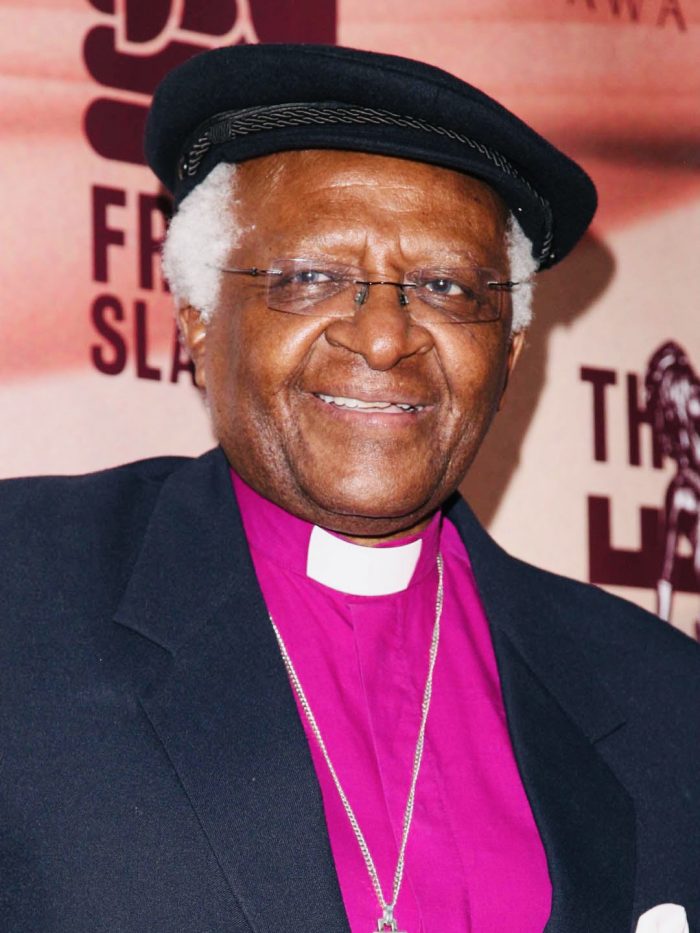
From One Legendary Leader in the Evening to Another One in the Morning–a Tribute to Archbishop Desmond Tutu

The beloved late Desmond Tutu (photo: Yaw Perbi does not own the rights to the picture and owner is unknown).
I was emailed this incredible tribute by a mentor of mine in the Lausanne Movement, Dr. Michael Cassidy, to his late friend Archbishop Desmond Tutu, that I just had to share as a student of leadership. What impresses you most? May many Cassidies and Tutus be raised in our generation!
Tribute to Archbishop Desmond Tutu
from
Michael Cassidy
Founder, African Enterprise
Honorary Chair, The Lausanne Movement
Archbishop Desmond Tutu, one of South Africa’s greatest ever luminaries, both ecclesiastical & national, has gone to be with His Lord. People from every race, sector & background will mourn his passing, because he was a man for all who stood without fear or favour for the human rights of all.
Perhaps it is as an almost unequalled African champion for human rights that he will be most fondly & universally remembered. And it was for this that he justly became a Nobel Laureate.
In South Africa his immensely courageous fight against Apartheid earned him the fearsome opprobrium of the National Party Government, the settled hostility of most whites, but the thankful adoration of all people of colour, as well as more liberal whites. In fact, from the church, his voice during those dread years, was by far the most audible, & his persona by far the most visible. This audibility & visibility constituted a true achievement of note & contributed powerfully to the final fall of Apartheid.
As far as we were concerned in African Enterprise, Desmond was a friend to our work & contributed powerfully to conferences we organized or helped organize such as SACLA (South African Christian Leadership Assembly), the NIR (National Initiative for Reconciliation), & The Rustenburg Conference which represented the whole church spectrum & spoke to the whole range of political leadership from far left to far right.
At a personal level I also counted Desmond a good friend. He commended numbers of my books, including my recent Memoirs, & wrote the Foreword to my book The Politics of Love. We also shared in significant ministry together in African Enterprise’s city-wide mission to Kigali, Rwanda, a year after the genocide. That was very moving. I especially remember ministering with him in terrifying cells of pitifully jammed together prisoners. And then being with him as he collapsed in tears in one church filled with skeletal remains of murdered victims. There I saw his profound compassion poured out. Even as we tried to hold him up. Such shared moments one can never forget, culminating in our sharing the evangelistic preaching to a packed stadium in our final service.
And all this Desmond could do in spite of the fact that we had strong theological differences on certain issues such as Universalism & Gay Marriage. But he never allowed those to damage our friendship. And neither did I.
Thankfully in our recently produced documentary, The Threatened Miracle of South Africa’s Democracy, Desmond features strongly, both during the Apartheid years, but even afterwards when he severely scolded the ANC of Zuma’s time saying, “I’m warning you; I’m WARNING you; you are a disgrace!” No one else had that truly prophetic courage, credibility & ability to speak to all sides, all the time, AND be heard!
Yes, we will miss him… “the Arch”, as he was affectionately known, even by the media. But his legacy of prophetic witness will live on wherever South Africa’s story is told, & wherever racial justice & the Human Rights struggle are in purview.
To his dear, always supportive wife Leah, to his family, to his ministry colleagues, especially in the Anglican Church, we in African Enterprise world-wide extend our deepest sympathies, & assurances of heart-felt prayers at this time.
Dear Desmond — Beloved Arch — thank you for blessing us with your life. Au revoir. We will see you in the Morning.
Michael Cassidy
Founder of African Enterprise

Whoever Takes the Son Gets It All
Years ago, there was a very wealthy man who, with his devoted young son, shared a passion for art collecting. Together they traveled around the world, adding only the finest art treasures to their collection. Priceless works by Picasso, Van Gogh, Monet and many others adorned the walls of the family estate. The widowed, elder man looked on with satisfaction as his only child became an experienced art collector. The son’s trained eye and sharp business mind caused his father to beam with pride as they dealt with art collectors around the world.
As winter approached, war engulfed the nation, and the young man left to serve his country. After only a few short weeks, his father received a telegram. His beloved son was missing in action. The art collector anxiously awaited more news, fearing he would never see his son again. Within days, his fears were confirmed. The young man had died while rushing a fellow soldier to a medic.
Distraught and lonely, the old man faced the upcoming Christmas holidays with anguish and sadness. The joy of the season, a season that he and his son had so looked forward to, would visit his house no longer. On Christmas morning, a knock on the door awakened the depressed old man. As he walked to the door, the masterpieces of art on the walls only reminded him that his son was not coming home.
As he opened the door, he was greeted by a soldier with a large package in his hand. He introduced himself to the man by saying, “I was a friend of your son. I was the one he was rescuing when he died. May I come in for a few moments? I have something to show you.” As the two began to talk, the soldier told of how the man’s son had told everyone of his, not to mention his father’s, love of fine art. “I’m an artist,” said the soldier, “and I want to give you this.” As the old man unwrapped the package, the paper gave way to reveal a portrait of the son.
Though the world would never consider it the work of a genius, the painting featured the young man’s face in striking detail. Overcome with emotion, the man thanked the soldier, promising to hang the picture over the fireplace.
A few hours later, after the soldier had departed, the old man set about his task. True to his word, the painting went well above the fireplace, pushing aside thousands of dollars of paintings. And then the man sat in his chair and spent Christmas gazing at the gift he had been given. During the days and weeks that followed, the man realized that even though his son was no longer with him, the boy’s life would live on because of those he had touched. He would soon learn that his son had rescued dozens of wounded soldiers before a bullet stilled his caring heart.
As the stories of his son’s gallantry continued to reach him, fatherly pride and satisfaction began to ease the grief. The painting of his son soon became his most prized possession, far eclipsing any interest in the pieces for which museums around the world clamored. He told his neighbors it was the greatest gift he had ever received.
The following spring, the old man became ill and passed away. The art world was in anticipation! Unmindful of the story of the man’s only son, but in his honor, those paintings would be sold at an auction. According to the will of the old man, all of the art works would be auctioned on Christmas day, the day he had received his greatest gift. The day soon arrived and art collectors from around the world gathered to bid on some of the world’s most spectacular paintings. Dreams would be fulfilled this day; greatness would be achieved as many claim “I have the greatest collection.”
The auction began with a painting that was not on any museum’s list. It was the painting of the man’s son. The auctioneer asked for an opening bid. The room was silent.
“Who will open the bidding with $100?” he asked.
Minutes passed. No one spoke. From the back of the room came, “Who cares about that painting? It’s just a picture of his son. Let’s forget it and go on to the good stuff.”
More voices echoed in agreement. “No, we have to sell this one first,” replied the auctioneer. “Now, who will take the son?”
Finally, a friend of the old man spoke, “Will you take ten dollars for the painting? That’s all I have. I knew the boy, so I’d like to have it.”
“I have ten dollars. Will anyone go higher?” called the auctioneer.
After more silence, the auctioneer said, “Going once, going twice. Gone.” The gavel fell, cheers filled the room and someone exclaimed, “Now we can get on with it and we can bid on these treasures!”
The auctioneer looked at the audience and announced the auction was over. Stunned disbelief quieted the room. Someone spoke up and asked, “What do you mean it’s over? We didn’t come here for a picture of some old guy’s son. What about all of these paintings? There are millions of dollars of art here! I demand that you explain what’s going on here!” The auctioneer replied, “It’s very simple. According to the will of the father, whoever takes the son…gets it all.”
Puts things into perspective doesn’t it? Just as those art collectors discovered on that Christmas Day, the message is still the same: the love of a Father, a Father whose greatest joy came from His Son, who went away and gave His life rescuing others. And because of that Father’s love, whoever takes the Son, gets it all.
– Unknown

THE PRESENCE ~ Part 1 (of 3)
As I prayerfully pondered how best to enter 2022 personally as well as what to share with a church plant on the Akuapem mountains (in the Eastern Region of Ghana) that had invited me as guest preacher for their Watch Night service, THE PRESENCE became overwhelming clear.
WHAT DO YOU WANT FOR 2022?
Take a pause and sincerely answer the question: What do I want for 2022? How about THE PRESENCE as a present? Yes, God is everywhere (omnipresent) so why does He say where two or three are gathered in His name He is present, among them? God can choose to concentrate His presence in a person or place, and that is what I mean by THE PRESENCE. My aim is to show that everything you need for 2022 is in THE PRESENCE of the LORD; all you’ll ever want is in THE PRESENCE. At the end of this, my prayer is that like the Mariah Carey song, “All I want for Christmas is you,” you’ll leave here saying, “Dear God, all I need for the New Year is YOU!” so “All I want for the New Year, is YOU!”
HEAVEN CAN BE HELL
Four years ago, when I was still president of ISMCanada, I led a team to organize our biennial staff conference for most of our 100 staff from coast to coast to come to McGill University in Montreal, on the east coast of Canada. One of the devotional speakers I arranged to exhort the conference attendees was a young pastor (he’s a white African from Zimbabwe) from the Peoples Church of Montreal. Pastor Chris asked a question that I would like to repeat: HOW MANY OF YOU WOULD STILL LOVE TO BE IN HEAVEN EVEN IF GOD WASN’T THERE? My own response revealed my heart and I was shocked. I realized to my utter shock and shame, I didn’t really mind being in Heaven—the golden streets, tree of life, worship music, peace, no more sickness, sweat or tears…—even if God was absent.
But really, WHAT IS HEAVEN WITHOUT GOD? Heaven without God is hell! Samuel Rutherford put it this way, “O my Lord Jesus Christ, if I could be in heaven without thee, it would be a hell; and if I could be in hell, and have thee still, it would be a heaven to me, for thou art all the heaven I want.” Teresa of Avila said, “Wherever God is, there is heaven.” And for John Milton, “Thy presence makes our paradise, and where thou art is heaven.” Simply put, God’s presence is paradise.
Now, let me ask you: WOULD STILL LOVE TO ENTER 2022 EVEN IF GOD WASN’T THERE? 2022 without God is hell. Yet even Covid in 2022 with God is heaven. Everything you need is in the Presence of Yahweh; is it protection, provision, guidance, favour, promotion, strength…? It’s in all in THE PRESENCE. For many of us, we don’t mind having this stuff without God coming along! We want his hand but not his face; we want his stuff but not him. That is a tragedy of our times; an error!
SPIRIT-SATURATED SIMEON
This last Christmas season, I was really challenged by the Spirit-led life of Simeon in Luke 2. He was a righteous and devout man in Jerusalem who Joseph and Mary met when the time came for the purification rites required by the Law of Moses, and they took Jesus to Jerusalem to present him to the Lord. Interestingly, my main text for this message, Exodus 13, begins by explaining that what was written in the Law of the Lord—“Every firstborn male is to be consecrated to the Lord”—was part of the Exodus story as God killed all the firstborns of Egypt and spared the Israelites’.
Simeon was no special person per se—not a priest, prophet, pharisee, politician—just an ordinary guy who thought right, acted right, was in right and intimate relationship with the LORD and devoted to Him. He was waiting for the promised Jewish Messiah (“the consolation of Israel,” they would say) and the Holy Spirit was on him [THE PRESENCE]. It had been revealed to him by the Holy Spirit that he would not die before he had seen the Lord’s Messiah. Someone reading this needs revelation in 2022; it’s in THE PRESENCE.
Just check out at the intimacy in THE PRESENCE—such a deep thing that thousands of generations had waited for in faith, and God chooses to promise this sight to simple Simeon! It reminds me of Abraham’s intimacy with the LORD to the extent that God said, before he would rain judgment on Sodom & Gomorrah, “shall I hide what I’m about to do from Abraham].
Moved by the Spirit [THE PRESENCE compels, propels], he went into the temple courts right when the parents brought in the child Jesus to do for him what the custom of the Law required. Indeed, the steps of the righteous are ordered by THE PRESENCE]. Simeon took him in his arms [may you too take hold of and take delivery of God’s promises in 2022 by THE PRESENCE] and praised God [there is praise in THE PRESENCE], saying some amazing things which made Mary and Joseph “marvel” (v. 33), including prophesying some incredible things like the crucifixion, all of which could only have been revelation. Such is the life of an individual in THE PRESENCE.
In Part 2, I share about the remarkable Israelites-in-the-desert example of THE PRESENCE, so well-summarized in the following famous two-stanza Wesleyan hymn:
Captain of Israel’s host, and Guide
Of all who seek the land above,
Beneath Thy shadow we abide,
The cloud of Thy protecting love;
Our strength, Thy grace, our rule, Thy Word;
Our end, the glory of the Lord.
By Thine unerring Spirit led,
We shall not in the desert stray
We shall not full direction need
Nor miss our providential way;
As far from danger as from fear,
While Love, almighty Love, is near.
Find Part 2 here.

